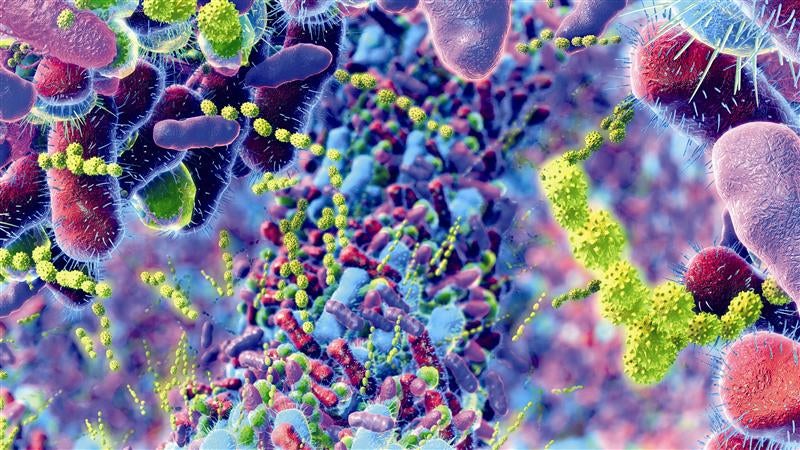 By Kat Procyk
By Kat Procyk
Infertility affects one in six people worldwide with its prevalence rapidly increasing, according to the World Health Organization.
While assisted reproductive technology, like in vitro fertilization and fertility medications, has extended the possibilities of conception, researchers still believe there’s a significant gap in the understanding of the biological processes that influence it.
Eldin Jašarević, assistant professor of obstetrics, gynecology and reproductive sciences and of computational and systems biology, School of Medicine, University of Pittsburgh, and his lab have uncovered how the gut microbiome—the extensive collection of bacteria, viruses, fungi and other microbes—regulates female reproductive lifespan. A new study published in Cell Host & Microbe shows that gut bacteria influence the rate at which females deplete their limited egg reserves and that dietary fiber can help preserve fertility and improve egg quality and pregnancy outcomes even when eating Western-style high-fat diets known to impair conception.
“When we discovered that the microbiome controls egg loss, we asked: what influences the microbiome? Diet was the clear answer," Jašarević said. "We focused on dietary fiber because it specifically nourishes the beneficial bacteria that emerge during the critical period when babies transition from breast milk to solid foods. These bacteria produce metabolites that we found directly impact ovarian health.”
Scientists have known for decades that mice lacking a microbiome, called germ-free mice, are “poor breeders,” but the mechanism behind it was unknown. Using germ-free mouse models, Jašarević's lab made a surprising discovery that explained this mystery. While these mice started life with twice as many eggs as normal mice, they lost them at twice the rate. By adulthood, germ-free mice had 50% fewer eggs, produced litters half as large, had reproductive lifespans cut in half and became infertile while normal mice were still reproducing. The team also observed ovarian scarring and early fibrosis, which are well-known indicators of premature reproductive aging.
To test whether diet could rescue fertility, the researchers fed mice high-fat diets with or without fiber supplementation. While high-fat diets alone led to only 30% embryo development success, adding fiber raised it to 80%, nearly matching normal fertility rates. The fiber seemed to work by feeding beneficial bacteria that produce short-chain fatty acids, metabolites that the team showed may affect egg survival in assisted reproduction settings.
These findings open the door to possible preventive treatments for infertility, like probiotics and dietary changes that support healthy microbiota. Critically, the study identified the early developmental period as the time when dietary interventions might have the greatest impact on future fertility. This indicates that childhood nutrition, not just adult diet, can influence reproductive health decades later.
These implications extend beyond fertility.
“We’re beginning to understand that diet and nutrition aren’t just short-term choices and that they’re deeply woven into the fabric of our lifespan,” Jašarević said. “It’s about understanding how what we consume shapes our biology, our microbiome and even the aging of organs we’ve long ignored—like the ovaries. As we live longer, the urgency grows: how do we truly eat for longevity?”
The findings may also explain emerging patterns seen in human reproductive disorders. Women with chronic conditions like endometriosis, polycystic ovarian syndrome, primary ovarian insufficiency and recurrent pregnancy loss notably have unique sets of microbial signatures compared to women without these conditions. Yet, it’s still unclear how the microbiome’s roles in metabolism, immune regulation and hormone balance contribute.
In a commentary published by the journal Microbiome that accompanies the paper, researchers argue that more research is needed to understand how microbes send signals to reproductive organs and how those signals affect fertility, and studies should be conducted before conception to investigate how specific microbial metabolites influence reproductive organs.
“By the time patients reach physicians with their infertility diagnosis, they’ve already endured months or years of trying,” said Julie M. Rios, associate professor of obstetrics, gynecology and reproductive sciences, School of Medicine, University of Pittsburgh, who was a coauthor of the commentary. “Asking them to change their diet and wait another six months is incredibly hard. That's why the real impact of this research lies in prevention—educating people before they conceive, integrating nutrition into annual care.”
The next question is, if diet contributes to infertility, can it also reverse it?
“That’s the frontier we’re exploring—and it’s a promising one,” Rios said.
The paper, “The Microbiota Extends the Reproductive Lifespan of Mice by Safeguarding the Ovarian Reserve,” was published on Sept. 25, 2025, and the commentary, “From Gut to Gamete: How the Microbiome Influences Fertility and Preconception Health,” was published on Sept. 26, 2025.
